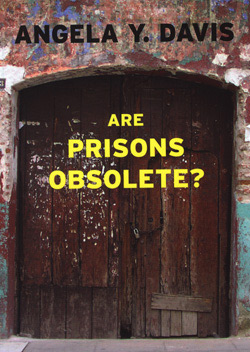Africana Center's reading project begins with Angela Davis book on abolishing prisons
By Daniel Aloi

More than 2 million Americans are currently behind bars, out of 9 million prisoners worldwide. The number of inmates in the U.S. has increased tenfold over the past 40 years. More prisons are being built, providing jobs where few better-paying options exist.
"Imprisonment has become the response of first resort to far too many of our social problems," says historian and activist Angela Davis, whose 2003 book "Are Prisons Obsolete?" is the inaugural title of an annual reading project at Cornell's Africana Studies and Research Center.
Inspired by the success of Cornell's New Student Reading Project, Africana faculty initiated the program to spur discussion on relevant issues. The project will engage Africana faculty, graduate students and the larger community in a series of public programs and related outreach projects.
"We said that we need to have discussion among ourselves about issues of public interest to the African and African-American communities, like social justice, economic inequities, racism, health and immigration issues," said Salah Hassan, director of the center. "We felt that as faculty we could engage intellectually around these issues."

Davis advocates abolishing the "prison-industrial complex" and argues for "decarceration," dismantling the prison system and transforming society as a whole to address the race, class and gender factors behind the incarceration of large numbers of minority Americans.
"During my own career as an anti-prison activist I have seen the population of U.S. prisons increase with such rapidity that many people in black, Latino and Native American communities now have a far greater chance of going to prison than of getting a decent education," Davis writes in the book, published by Seven Stories Press.
"It's a very good book, it's well articulated and accessible," Hassan said. "The book also ties in with globalization, the war on drugs, capital punishment, poverty and other social-economic contexts. This book is very deep in the argument that it raises. And above all, it is a book that challenges us to think outside the box."
Hassan said recent reports indicated that it costs $32,000 annually to maintain a prisoner in the state of New York, which is more than the cost of tuition for an undergraduate in state colleges or universities. African-Americans make up more than 50 per cent of the prison population, while they represent almost 16 per cent of the overall population, he said.
"In Ithaca we are surrounded, literally, by the prison-industrial complex," he said, mentioning facilities in nearby Elmira, Southport, Auburn and Moravia. "Communities, rather than relying on other means of making a living, [have] started to rely on prison employment and in calling for them to come."
Hassan said the state counts its disenfranchised prison population, which is predominantly black and Latino, as a factor in the distribution of seats for the U.S. Congress, while the same population is not allowed to vote.
Davis, a professor of history of consciousness at the University of California-Santa Cruz, is well known for her association with the radical Black Panther Party in the late 1960s and '70s. She remains an activist for racial and gender equality, and is a founder of Critical Resistance, a grassroots organization devoted to abolishing the prison system. She is also the author of "Abolition Democracy: Beyond Prison, Torture and Empire."
Africana faculty and students will discuss "Are Prisons Obsolete?" at a public forum, Nov. 7 at 4:30 p.m. in the Multipurpose Room at the Africana Center, 310 Triphammer Road, Ithaca.
Cornell Cinema recently presented a related film series, "On Trial: The Prison-Industrial Complex," in conjunction with the project and with the fall course Prisons (Government 314) taught by Mary Katzenstein.
In the spring, the Africana Colloquium Series and Black Authors/New Books Series will focus on "The Prison Industrial Complex: Incarceration and Punishment Regimes in the U.S. and Globally," culminating in a one-day conference on the theme. No date has been set, but the Africana Center intends to invite Davis to participate.
The project also involves collaborations with Cornell's Prisons Project, The Future of Minority Studies, the Society for the Humanities, Ujamaa residential college and the Minority, Indigenous and Third World Studies Research Group.
Undergraduate students and others interested in prison issues can also participate in the project; a limited number of copies of "Are Prisons Obsolete?" are being made available to the larger community.
For more information on the book project, contact the Africana Center at (607) 255-4625.
Media Contact
Get Cornell news delivered right to your inbox.
Subscribe